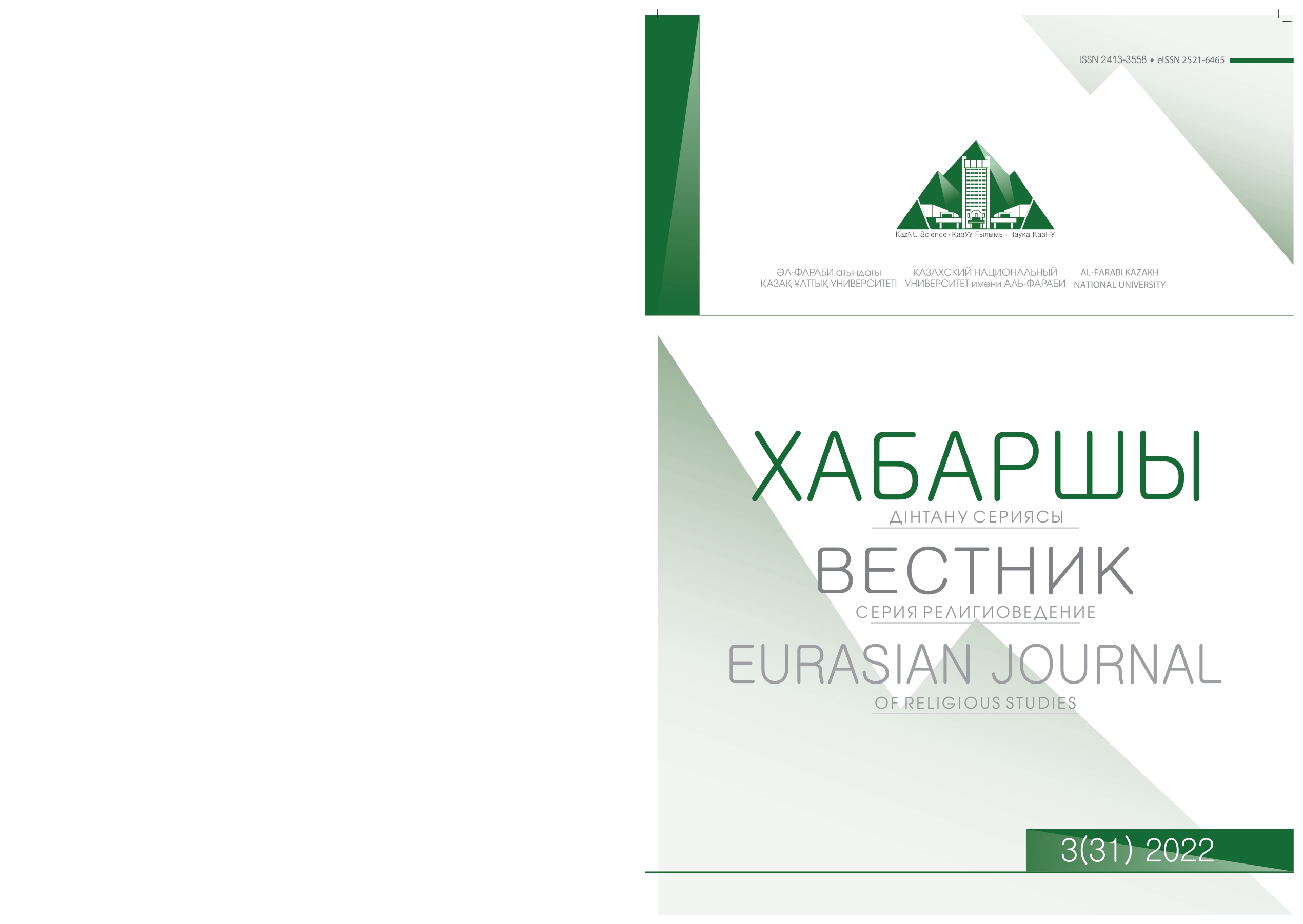What is the wisdom in creation? The sample of Maturidi
DOI:
https://doi.org/10.26577//EJRS.2022.v31.i3.r3Keywords:
wisdom, Mâtürîdî, creation, evil, goodAbstract
Hikmah is an infinitive consequent from the Arabic root "hkm" and means deep and valuable knowledge, wisdom, unseen cause. Hikmah means "to make a fair judgment, to know, to understand, to avoid, to prevent persecution" and is a feature that prevents and hinders people from cruelty and death. According to Imam Maturidi, hikmah is the ability to distinguish (fiqh) between right and incorrect, truth and falsehood. Therefore, it is the reason to attain many good both in the world and in the hereafter. Maturidi also defines wisdom as “being accurate in putting everything in its proper place and giving every rightful person their right and not eating anyone's rights”. The judge is God, who puts everything in its proper place, who does not make any mistakes in his precautions, who is a scholar, the lord, who knows everything, who knows nature, who is a doctor, who rules everything and is the "the Judge-Judge". In the sense of ruling when used for Allah, knowing and creating beings in the most perfect way, arranging them in harmony with each other, the ruler "knows all the objects and events that are suitable for justice, science and youth with the highest knowledge, and all objects of nature are harmonious, sound and It is used to mean creating and sustaining an artist. Accordingly, Allah created all the creatures in the universe for a specific purpose and purpose. However, some creatures appear harmful, and many beings in the vast universe are at a distance and quality that cannot be evaluated with the understanding of wisdom. In this paper, we will examine Mâtürîdî's evaluations on the negativities in the world and the meaninglessness in the universe.
Keywords: wisdom, Mâtürîdî, creation, evil, good
References
Arpaguş, Hatice (2005) “Allah-İnsan İlişkisinde Rahmet ve Gazab”. – Istanbul: Marmara Üniversitesi İlahiyat Fakültesi Dergisi 29 (2): 41-62.
Bekir Topaloglu. Islam teologiyasy. Kirispe. Audar. N.Zh. Baitenova, S.U. Abzhalov/okulyk. – Almaty: 2014. – 276.
Beyazizade, Ahmet (1996) Usulu’l-Münife li-İmam Ebi Hanife: İmam Azam Ebu Hanife’nin İtikadi Görüşleri. çev. İlyas Çelebi. – İstanbul: MÜİFV Yayınları. – 352.
Demir, Osman Nuri (2019) “İmam Mâtürîdî’de İnsan: Ruh, Nefs Ve Beden İlişkisi Üzerine Bir İnceleme”. KADER 17 (1): 228-254.
Gazzali, Ebu Hamid (2018) Esmâ’ül Hüsnâ Şerhi. trc. M. Ferşat. – İstanbul: Merve Yayınları. – 219.
İzmirli, İsmail Hakkı (1981) Yeni İlmi Kelam. nşr. Sabri Hizmetli. – Ankara: Ümran Yayınları. – 279.
Kadi Abdulcabbar, Ebu’l-Hasan (1965) Şerhu’l-Usûli’l-Hamse. nşr. A. Osman. – Kahire: Mektebetu Vehbe. – 569.
Karadaş, Cağfer (1997) İbn Arabi’nin itikadi görüşleri. – İstanbul: Beyan Yayınları. – 186.
Kurt, Fatih (2019) Nesefi Akaidi Şerhi. – Ankara: Akçağ Yayınları. – 53.
Mâtürîdî, Ebu Mansur (2001) Kitabü’t-Tevhid. thk. Bekir Topaloğlu, Muhammed Aruçi. – İstanbul: İsam Yayınları. – 771.
Oral, Osman (2015) “Mâtürîdî’de Akıl ve Yaratılış Hikmeti”. Necmettin Erbakan Üniversitesi İlahiyat Fakültesi Dergisi 40: 139-158.
Semerkandi, Şemseddin (2017) es-Sahaifü’l-İlahiyye. Trc. Ramazan Biçer. – Ankara: Türkiye Bilimler Akademisi Yayınları. – 277.
Teftazânî, Saadeddin (1999) Şerhu’l-Akâid. trc. Süleyman Uludağ. – İstanbul: Dergâh Yayınları. – 398.
References
Acluni, İsmail b. Muhammed (1988) Keşfü’l-Hafâ ve Müzilü’l-İlbas [Disclosure of Аnonymity]. – Beyrut: Dâru’l-Kütübi’lİlmiyye. – 164. (in Turkish)
Arpaguş, Hatice (2005) “Allah-İnsan İlişkisinde Rahmet ve Gazab” [“Mercy and wrath in the relationship between Allah and Man”]. – Istanbul: Marmara Üniversitesi İlahiyat Fakültesi Dergisi 29 (2): 41-62. (in Turkish)
Bekir Topaloglu. Islam teologiyasy. Kirispe [Theology of Islam. Introduction]. Audar. N.Zh. Baitenova, S.U. Abzhalov/okulyk. – Almaty: 2014. – 276. (in Kazakh)
Beyazizade, Ahmet (1996) Usulu’l-Münife li-İmam Ebi Hanife: İmam Azam Ebu Hanife’nin İtikadi Görüşleri [Views of Imam Agzam Abu Hanifa in Faith]. Çev. İlyas Çelebi. – İstanbul: MÜİFV Yayınları. – 352. (in Turkish)
Demir, Osman Nuri (2019) “İmam Mâtürîdî’de İnsan: Ruh, Nefs ve Beden İlişkisi Üzerine Bir İnceleme” [“Man in Imam Maturidi: A Review of the Relationship between Spirit, Soul and Body”]. Kader 17 (1): 228-254. (in Turkish)
Gazzali, Ebu Hamid (2018) Esmâ’ül Hüsnâ Şerhi [Description of Names of Alla]. trc. M. Ferşat. – İstanbul: Merve Yayınları. – 219. (in Turkish)
İzmirli, İsmail Hakkı (1981) Yeni İlmi Kelam [New Science Kalam]. nşr. Sabri Hizmetli. – Ankara: Ümran Yayınları. – 279. (in Turkish)
Kadi Abdulcabbar, Ebu’l-Hasan (1965) Şerhu’l-Usûli’l-Hamse [Description of the five bases]. nşr. A. Osman. – Kahire: Mektebetu Vehbe. – 569. (in Arabic)
Karadaş, Cağfer (1997) İbn Arabi’nin itikadi görüşleri [Іbn Аrabi's views in faith]. – İstanbul: Beyan Yayınları. – 186. (in Turkish)
Kurt, Fatih (2019) Nesefi Akaidi Şerhi [Description of aqida of Nasafi]. – Ankara: Akçağ Yayınları. – 53. (in Turkish)
Mâtürîdî, Ebu Mansur (2001) Kitabü’t-Tevhid [The Book of Tawhid]. thk. Bekir Topaloğlu, Muhammed Aruçi. – İstanbul: İsam Yayınları. – 771. (in Turkish)
Oral, Osman (2015) “Mâtürîdî’de Akıl ve Yaratılış Hikmeti” [The Wisdom of Reason and Creation in Maturidi]. – Konya: Necmettin Erbakan Üniversitesi İlahiyat Fakültesi Dergisi 40: 139-158. (in Turkish)
Semerkandi, Şemseddin (2017) es-Sahaifü’l-İlahiyye [Holy Scriptures]. Trc. Ramazan Biçer. – Ankara: Türkiye Bilimler Akademisi Yayınları. – 277. (in Arabic)
Teftazânî, Saadeddin (1999) Şerhu’l-Akâid [Description of Aqida]. trc. Süleyman Uludağ. – İstanbul: Dergâh Yayınları. – 398. (in Turkish)




